Diplomatic Bluebook 2015
Chapter 4
Japan’s Diplomacy Open to the Public
1.Overseas Risks and Safety of Japanese Nationals
(1) Incidents and Accidents in 2014 and Countermeasures
As more Japanese nationals have been traveling overseas in recent years, there is a greater risk for them to become involved in atrocious incidents and contingent events (see Chapter 3-1-3-(3) for details). On January 20, 2015, video of two Japanese nationals captured in Syria by the Islamic State of Iraq and the Levant (ISIL) was posted on the Internet, which was appeared to be followed by the killing of these two hostages in this terrorist incident (See Focus on page 20 for details).
Terrorist attacks occurred mainly in the Middle East, Africa and South West Asia; examples of terrorist attacks include attacks on government facilities, such as security authorities, indiscriminate terrorism targeting citizens in places where many people congregate, such as public transportation facilities, religious facilities and markets, and capturing/killing of hostages perpetrated by Islamic extremist groups, such as ISIL, al-Qaeda and the Taliban.
Terrorism committed by individuals motivated by Islamic extremism occurred also in the Western countries. A Canadian soldier was shot and killed in October in Ottawa (Canada) and hostages were seized and held by a gunman in central Sydney (Australia) in December. A series of terrorist attacks occurred in January 2015, including an attack on a newspaper office in the city of Paris (France).
Kidnappings of foreign nationals also occurred around the world.
Murder incidents of Japanese nationals occurred in crimes in several countries such as the Philippines, Thailand and the United States.
Incidents in which Japanese nationals were involved include missing Japanese nationals while scuba diving off Bali island in Indonesia in February, collapsing the buildings by the explosion in New York (US) in March, car accidents in California (US) in August and November, and collision between a sightseeing boat and a fishing boat in Brazil in September.
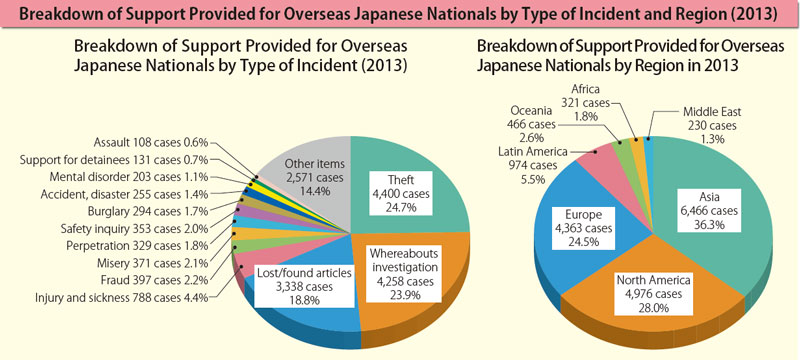
As for large-scale natural disasters, a number of trekkers of various nationalities including three Japanese nationals were killed in severe snowstorms and avalanches, caused by a cyclone on and around the mountains of Annapurna and Dhaulagiri of Nepal within the Himalaya range in October.
As a case of a serious deterioration of security caused by political instability, although no Japanese nationals were involved in anti-government demonstrations in Thailand from the fall of 2013 to May 2014 caused continuous chaos with occasional shooting incidents, etc. resulting in some deaths and injuries.
Also in Ukraine, “annexation” of Crimea Autonomous Republic by Russia in March intensified the confrontation between the Ukraine Government and armed forces; situations stayed unstable particularly in the Donetsk and Luhansk regions in the East, and the Government of Japan provided information for its nationals in Ukraine.
Hostilities between Israel and Palestinian armed groups in Gaza intensified in June and July. Israel launched large-scale air attacks on Gaza and the rockets fired from Gaza landed in Israeli territory.
From September, the Hong Kong protest movement, “Occupy Central,” organized by students and pro-democracy activist groups, went on a sit-down strike over the political reform issue. The situation was confused for several months such as occurring a confrontation between these groups and police trying to clear the protest site.
There have been reports of incidents in the mountains and the sea involving middle-ages and seniors, and also of persons becoming ill while traveling; in particular, there were a number of cases of deaths caused by sudden illness when staying at hotels. In dealing with such incidents or illnesses, there were some cases where the family members of the victims faced troubles due to extremely high medical or transportation costs compared to those in Japan or insufficient medical services.
The Ebola outbreak in West Africa, namely Guinea, Liberia and Sierra Leone, had a global impact, resulting in the formal declaration of a Public Health Emergency of International Concern (PHEIC) by the World Health Organization (WHO). MOFA issued an infectious disease risk advisory for these three affected countries on August 8, 2014 and released Spot Safety Info and Region-wide Safety Info on the relevant areas to provide information on the status of the outbreak and infection prevention measures to Japanese nationals traveling and living overseas and raised caution on traveling and staying abroad.
Cases of human infection with avian influenza A (H7N9) in China and the Middle East respiratory syndrome coronavirus (MERS-CoV) in the Middle East were confirmed respectively. Malaria, Dengue fever and other mosquito-borne infectious diseases infected millions of people around the world. Concerns over health hazards caused by air pollution are still growing in emerging countries, such as China, India and Southeast Asia.
[Tips for Traveling and Living Abroad]
As described in the earlier sections, emergency situations posing threats to the safety of Japanese nationals are continuously occurring all around the world. When traveling and living abroad, the following actions must be taken: (1) to check overseas security information in advance on the Overseas Safety Website or through media reports, etc, (2) to take full safety measures and risk aversion actions to prepare for emergency situations while abroad, and (3) In an emergency, to contact the Japanese diplomatic missions overseas nearby, such as the embassy/consulate general, and family members in Japan in the event of an emergency. Expensive medical fees may be incurred abroad due to diseases and accidents, and it may be difficult to pay the medical cost or to receive proper medical care without travel insurance. It is extremely important for each individual traveler to purchase travel insurance with sufficient coverage.
(2) Safety Measures for Japanese Nationals Abroad
As Japanese nationals expand their roles and presence in the international community, the number of Japanese nationals abroad for which diplomatic missions overseas and the Interchange Association, Japan provided support and protection increased in 2013 to 19,746 persons from 17,426 persons of 10 years ago (2003)1. In order to ensure the safety of Japanese nationals abroad, the protection systems in the diplomatic missions overseas have been strengthened. Still, it is necessary for each individual person to have awareness for risk management and take actions with understanding of risk trends and safety measures overseas. For those purposes, MOFA is enhancing and improving the contents of the Overseas Safety Website for the provision of safety information and revises the functions and design of the website to enhance its usability.
The Consular Service Center of MOFA provides advice on safety issues abroad. In order to provide detailed response to the activities of Japanese nationals abroad, the center distributes a booklet titled “Kaigai Anzen Toranomaki” (“Essential Safety Tips for Overseas Travel”) which contains comprehensive safety measures, as well as pamphlets describing measures to be taken in each predictable case, such as terrorism, kidnapping and intimidation. These pamphlets can also be downloaded from the overseas safety website.
Drawing lessons from the 2013 terrorist attack in Algeria involving Japanese nationals, MOFA is committed to enhancing the safety measures for Japanese nationals and companies overseas. As part of such efforts, MOFA launched the MOFA “Overseas Travel Registration” on July 1, 2014. This new scheme aims to provide registered persons with the latest overseas travel safety information and emergency contacts in the event of an emergency by asking short-stay (less than three months) travelers (those on tours or business trips), who are not required to submit the Overseas Residential Registration, to register their travel itineraries, including their place of stay and contact number. Furthermore, MOFA aims to develop a multilayered and complementary communication system to ensure the safety of Japanese nationals abroad: e.g. partial introduction of using Short Message Service (SMS)2 of mobile phones as a one of the means to confirm safety in the event of an emergency.
The report of the government’s verification committee and the report of the advisory committee on safety of Japanese nationals and firms overseas established in response to the terrorist incident against the Japanese nationals in Algeria recommended enhancing government and private collaboration. As one of the specific measures based on the recommendation, MOFA and relevant ministries co-hosted the follow up meeting of the “Intensive Public-Private Joint Seminar on Overseas Safety Measures” in October with an aim to improve knowledge on risk management and the capacity of safety management officers of private companies. In order to provide Japanese companies engaged in overseas business operations with information on risk management, the “Seminar on Safety Overseas” was held in Osaka (March), Nagoya (July) and Sendai (December). Hands-on training for responding to terrorism and kidnapping in June and September was participated in by both public and private sectors in order to further effectuate the private-public collaboration in responding to emergency situations. Moreover, the meetings of the “the Liaison Committee of Government and non-Government for Overseas Security” are held periodically to exchange information and opinions and to consult and discuss the common issues between Japanese private companies/organizations engaged in overseas activities and MOFA.
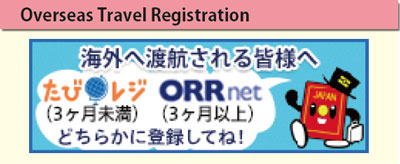
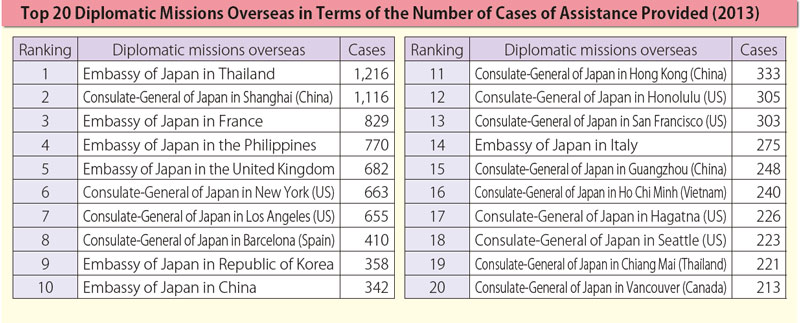
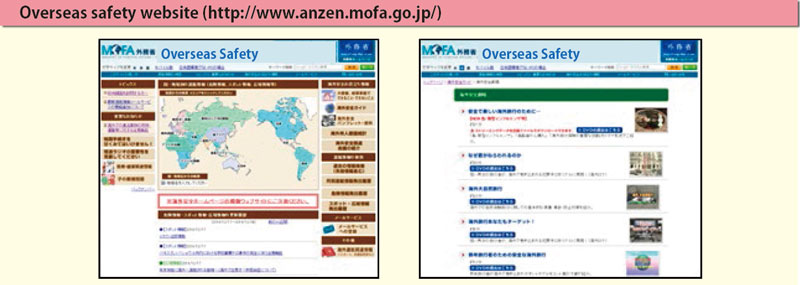
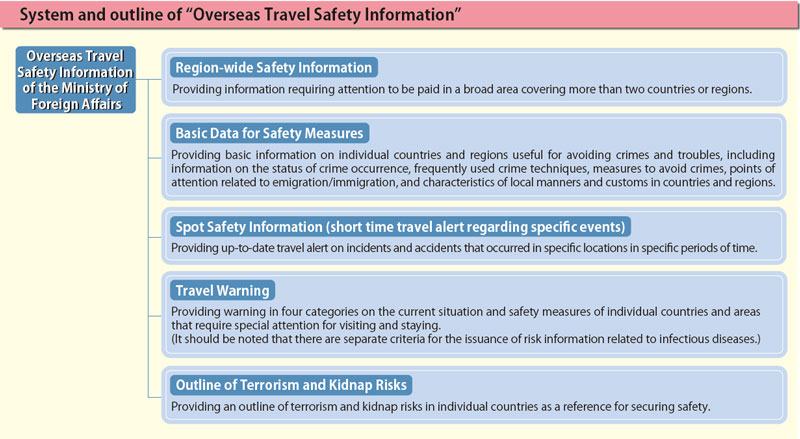
The diplomatic missions overseas also hold regular meetings of the “the Security Consultation and Liaison Committee” comprising local Japanese organizations and private representatives to enhance opinion exchange and information sharing regarding safety measures. The “Seminar on Safety Overseas” was held at a total of 20 foreign cities to raise awareness about safety measures and risk management of Japanese residents in the Middle East, Africa, Central and South America, and Asia.
- 1 The Statistics on Assistance for Japanese Involved in Accidents and Other Incidents is an annual report on the number of Japanese nationals involved in any kind of troubles in foreign countries, such as incidents/accidents, acts of committing crimes, and falling victim to crime or disaster, and have received assistance provided by the diplomatic missions overseas and/or the Japan Foundation and was published in 1986 for the first time.
- 2 Service sending a short text message between mobile phone or PHS users.
